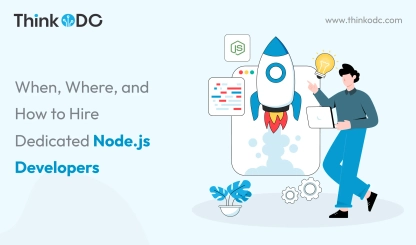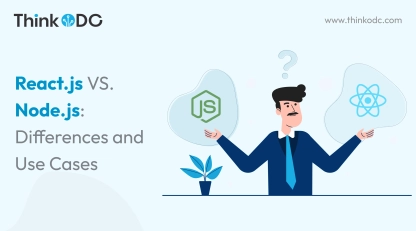Node.js is a server-side platform that has taken over the world of web development. According to Statista, Node.js has surpassed React.js as the most popular web framework among software developers worldwide.

It's no surprise that Node.js has become one of the most popular choices for building web applications, thanks to its lightning-fast speed and ability to handle a high volume of requests.
But what makes Node.js so quick? What are the best applications for this platform?
This blog will look at the underlying technology that makes Node.js such a fast platform. We'll delve into the details of what makes Node.js tick, from non-blocking I/O to the single-threaded event loop.
And, because knowledge is useless without application, we'll also look at some of the most common Node.js use cases. Whether you're creating real-time web apps, streaming services, chat applications, or anything in between, Node.js has you covered.
So, get ready to learn about one of the web development world's fastest and most versatile platforms. With its speed and scalability, Node.js is the Usain Bolt of server-side platforms. And, like Usain, it's ready to set the web development world on fire.
Why is Node.js so Fast?
Node.js is fast for a variety of reasons, but three stand out: non-blocking I/O, event-driven architecture, and a single-threaded event loop.
Let's go over each reason in greater depth.
Non-blocking I/O
Node.js employs a non-blocking I/O model, which means it can handle multiple input/output operations at the same time without waiting for previous operations to respond.
A blocking I/O model requires the server to wait for each I/O operation to complete before proceeding to the next, which can result in slow processing times.
I/O operations in Node.js are handled asynchronously, allowing the server to continue processing other requests while I/O operations are complete. This non-blocking I/O model allows Node.js to handle a large number of requests quickly and efficiently.
Event-driven architecture
Node.js employs event-driven architecture, which means it is organised around a series of events. When a request is received, an event is triggered, and Node.js handles the event and responds to the request using its non-blocking I/O model.
The event-driven architecture of Node.js is based on the idea that the server should be able to handle multiple events at once without being slowed down by any single one. Node.js is highly scalable because it can handle an infinite number of events without slowing down.
Single-threaded event loop
Node.js employs a single-threaded event loop, which means that all incoming requests are handled by a single thread. This design choice contributes to the platform's performance by simplifying the code.
Node.js eliminates the need for complex thread coordination and locking mechanisms, which can slow down request processing on other platforms, by using a single thread.
The Node.js event loop is designed to handle multiple requests efficiently and quickly, allowing the platform to process a large number of requests in a short period of time.
Overall, the combination of non-blocking I/O, event-driven architecture, and the single-threaded event loop makes Node.js a fast and efficient platform for building web applications.
You now understand what makes Node.js so fast. Let's break it down even further with the help of use cases.
Top 5 best use cases for Node.js
Node.js is a versatile platform that can be used for a variety of purposes. However, five use cases stand out as the "best" Node.js use cases due to their speed, scalability, and versatility.
Real-time web applications, streaming services, chat applications, REST APIs, and microservices are examples.
Let us go over them one by one:
Real-time web applications
One of the best use cases for Node.js is building real-time web applications. With its non-blocking I/O, event-driven architecture, and single-threaded event loop, Node.js is well-suited to handling real-time interactions between the server and client, such as updates to data or notifications.
Real-time application with Node.js can provide a smooth and responsive user experience, which is why it's commonly used for applications like online games, stock tickers, and collaborative tools.
Streaming services
Creating streaming services is another excellent application for Node.js. Node.js can handle the high volume of requests that come with serving up video or audio content in real-time thanks to its non-blocking I/O.
The platform's scalability and efficiency make it ideal for developing streaming services for live events, video on-demand, or audio streaming.
Chat applications
Chat applications are another area where Node.js shines. With its event-driven architecture and ability to handle real-time interactions, Node.js is a great choice to build chat applications.
Node.js can handle the high volume of requests and real-time updates that come with chat applications, whether you're building a simple chat room or a complex chat system with multiple rooms.
REST APIs
Node.js is also an excellent choice for developing REST APIs. Node.js can handle a high volume of requests efficiently due to its non-blocking I/O and event-driven architecture, making it well-suited to building REST APIs.
Node.js can help you build a scalable and efficient API that can handle a high volume of requests, whether you're building an API to support a web app or a mobile app.
Microservices
Node.js is an excellent framework for developing microservices. Node.js is well-suited to building small, independent microservices that can be combined to build larger, more complex applications because of its small footprint and ability to handle a high volume of requests.
Node.js can help you build scalable and efficient microservices that can handle a high volume of requests, whether you're building microservices for a monolithic application or for a serverless architecture.
Conclusion
In conclusion, Node.js is a fast, scalable, and versatile platform that is well-suited to a wide range of use cases. Whether you want to build a web application, a streaming service, a chat application, a REST API, or a microservice, Node.js can help you build a fast and efficient solution.
If you are looking to build a web application or a platform using Node.js, choose ThinkODC - a leading Node.js app development company trusted by global clients for offering high-quality and scalable web and app development services.
When you hire dedicated Node.js developers from ThinkODC, you can get personalized and innovative solutions that cater to your unique business requirements.
By partnering with ThinkODC, you can have peace of mind as we ensure the timely delivery of projects, with a focus on quality and customer satisfaction.




